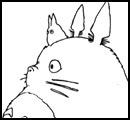Spoilers, spoilers…
“Watchmen” has a better ending than Alan Moore and Dave Gibbons’ original holy book. Instead of using a “giant alien squid,” Ozymandias uses Dr. Manhattan’s energy to cause the destruction. The change gets the same point across and connects snugly with what’s come before. The tragedy of Dr. Manhattan’s downfall is of no consequence to him, as he’s, at this point, become completely unconcerned with the affairs of humans.
The change also shows the skill of director Zack Snyder. He really does get it. For the most part, “Watchmen” is obsessively faithful to the book. Frame after frame is xeroxed directly from the page. This alone is a remarkable technical feat. But it’s a little unnecessary. The additions and, tellingly, subtractions, of Snyder and screenwriters David Hayter and Alex Tse shore up the narrative, making the characters resonate outside of the theater. Gone are the generous matching-cuts with “Tales of the Black Freighter,” so effective as a book within the book, so time-consuming and distracting if they had been in the movie.
“Watchmen” is a complete, complex parallel world, further distanced through its exploitation/parody of the eighties concern over Soviet nuclear annihilation. With the exception of Dr. Manhattan, superheroes have no super powers. Sure, Rorschach can scale fences with well-placed leaps and Silk Spectre II has the strength of a person three times her weight. These can be accepted, like wirework in kung fu movies.
At its heart, “Watchmen” gets to why anyone would want to fight crime in this way in the first place. The novel structure of the comic—and now of the movie—involves disparate pieces completing a whole. Like Dr. Manhattan’s mind, the film seamlessly moves from the just-as-complex alternate past to the present, from character to character.
As to their motivations: Dr. Manhattan feels he has no choice. A being of his power must be used for good. (“Good,” meaning the causes of the U.S. and five-term president Richard Nixon.) The movie takes place as he’s solidifying his apathy towards anything smaller than, say, a planet. “Good” and “bad” have no meaning to him. Rorschach is a functioning psychopath, Travis Bickle meets The Punisher. He’s the twisted conscience of the movie, in the end unable to live with his own ethical morass. Nite Owl’s story is less interesting, maybe less fleshed-out. He’s effectively Batman, with a hidden subway tunnel of gadgets and costumes. He wants to make a difference, but he’s much too flawed to really give a damn either way.
They fight in a world with no future. The golden age—of superheroes, of humanity—has come and gone. It may never have existed in the first place. Yeah, “Watchmen” is pretty bleak.


2 comments:
A note on criticism of "Watchmen."
I'm baffled by Hope Madden's one-star "Other Paper" review of this film.
Anthony Lane, of "The New Yorker," is such a great writer, isn't he? I still am unclear on what he thinks about "Watchmen."
Roger Ebert saw it twice. And reviewed it twice!
I really liked it too. Some of the cast was questionable, but all in all, I was entertained the entire time.
Post a Comment